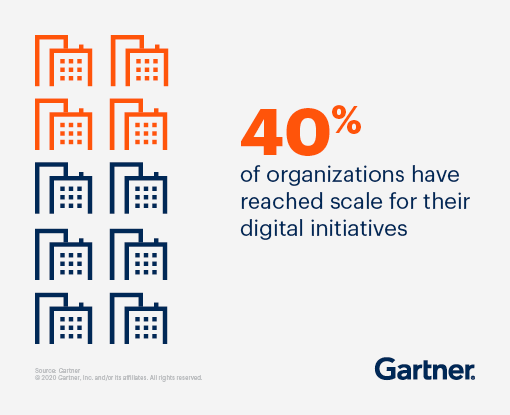
The way we work is definitely changing. Gone are the days where we had mountains of papers to sort through daily. COVID 19 has accelerated the transformation of today’s workplace. We are now in an era of new habits, new ways of working and communicating.
In this blog series, I will touch on a few aspects of digitisation in the modern workplace. In the first part, I will give insights into what different research organizations think about automation as well as our experience assisting our customers with digital transformation. Part 2 will focus on how digitisation has revolutionised the way the HR department function. Finally, in Part 3 we will deep dive into automation in the finance department.
Let us now talk about the modern workplace. Research says 87% of senior business leaders think digitalisation is a company’s priority, yet only 40% of organisations have brought digital initiatives to scale. The gap between aspiration and achievement is widening for enterprises attempting digital business transformation as per the Gartner report.

With “Transformed experiences” becoming a competitive differentiation, enterprises are now in the race to accelerate their digital initiatives. In fact, analysts at Forrester said, “In 2021, we predict that companies will accelerate digital transformation with a focus on customers and the products, practices, platforms, partners, and places to sell to and serve them.”
Based on our experience and expertise in diverse sectors, we believe that effective digital transformation should involve:
As macroeconomic conditions continue to put pressure on profit margins across sectors, cost productivity and unlocking new value are back at the top of the senior-management agenda….. The question is, what is the next step?
That’s where Digital process automation (DPA) comes in. DPA is believed to be the core part of companies’ next-generation operating models.
In essence, DPA is an emerging set of new technologies that combines fundamental process redesign with robotic process automation and machine learning. It is a suite of business-process improvements and next-generation tools that assists the knowledge worker by removing repetitive, replicable, and routine tasks. It can radically improve customers’ journeys by simplifying interactions and speeding up processes.
At AMO, we have accompanied many businesses in their digital transformation journey. Based on our customers’ challenges and objectives, we have built bespoke digital automation solutions to help them to overcome these impediments.
We would love to hear about your challenges too. Meet us face-to-face on the 11th of November for a collaborative exchange on Digital Automation in our HQ in London at 2 30pm. Followed by drinks, canapes, and breath-taking views of the City Skyline. Register here
PS: Stay tuned for part 2 of our blog! I will be giving you insights on transforming processes in the HR department using automation.
We gather information about your needs and objectives of your apps. Unsure about the app you need? We will carefully assess your top challenges and provide expert guidance on the perfect solution tailored to your success.
We create wireframes and an interactive prototype to visualise the app flow and make changes as per your feedback.
Estimation of the project deliverables including the resources, time, and costs involved.
Showcasing POC to relevant stakeholders illustrating the functionalities and potential of the app to meet business objectives.